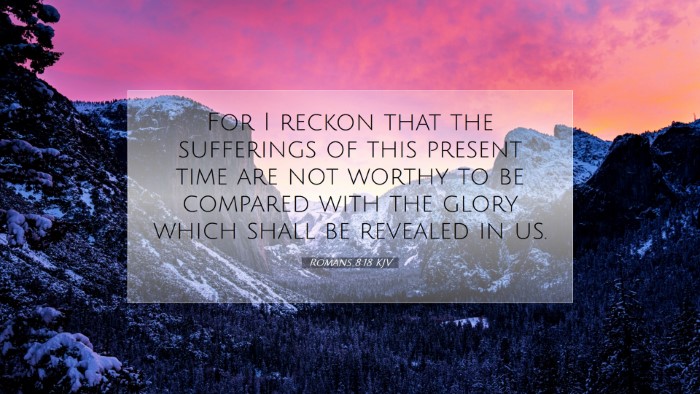Commentary on Romans 8:18
Romans 8:18: "For I consider that the sufferings of this present time are not worth comparing with the glory that is to be revealed to us."
Introduction
This verse serves as a pivotal point in the Apostle Paul's exposition on the themes of suffering and glory in the life of believers. In this commentary, we will draw insights from several public domain commentaries, including those by Matthew Henry, Albert Barnes, and Adam Clarke, to illuminate the depth and breadth of this profound statement.
Contextual Analysis
Understanding the Context: Paul writes to the church in Rome at a time when Christians faced considerable persecution. This context of suffering sets the stage for his profound theological reflection on the nature of present afflictions versus future glory.
-
Matthew Henry: He emphasizes that understanding the sufferings of this present time is crucial for the Christian. These afflictions are momentary and temporary, but the glory to be revealed is eternal and outweighs these hardships.
-
Albert Barnes: Barnes elaborates on the nature of suffering in the life of believers, pointing out that while suffering is real and painful, it serves a purpose in God’s divine plan, preparing the believer for an incomparable future glory.
-
Adam Clarke: Clarke suggests that the sufferings referred to may include physical pain, persecution, and spiritual struggles, all of which, while significant, pale in comparison to the promise of glory that awaits believers.
The Nature of Suffering
Definition of Sufferings: In this verse, Paul does not attempt to diminish the reality of suffering. Rather, he acknowledges its existence and magnitude. Suffering can take many forms, as indicated by the broad interpretations offered by the commentators.
-
Matthew Henry: He observes that sufferings may be both collective, affecting the Church as a whole, and individual, touching upon personal trials faced by believers.
-
Albert Barnes: He stresses that the current afflictions can lead to a deeper understanding of God’s grace and a sharpening of faith, which ultimately prepare us for the glory ahead.
-
Adam Clarke: Clarke emphasizes the redemptive quality of suffering, noting that it can lead to spiritual growth and a more profound relationship with God.
Comparative Analysis of Glory
The Contrast with Glory: The phrase “not worth comparing” underscores the vast disparity between present sufferings and future glories. Paul builds a strong antithesis to illustrate the Christian hope.
-
Matthew Henry: Henry argues that the “glory to be revealed” includes the fullness of redemption, communion with God, and the ultimate victory over sin and death, which offers an incomparable hope.
-
Albert Barnes: Barnes remarks that this glory will be fully realized at the Second Coming of Christ when believers will share in His glory, elevating the promise of eternal life.
-
Adam Clarke: Clarke adds that this glory is not merely a future event but influences the daily life of believers, providing a present comfort and motivation to endure hardship.
Theological Implications
Implications for Believers: This verse speaks powerfully to the Christian experience, providing hope and assurance. Understanding that current trials are temporary and purposeful can transform how believers face adversities.
-
Matthew Henry: He highlights the importance of maintaining a heavenly perspective on earthly suffering. The believer is called to look beyond immediate pain to the glorious future that awaits.
-
Albert Barnes: Barnes inspires believers to cultivate a spirit of endurance and resilience through their trials, comforting them with the knowledge of their future inheritance in Christ.
-
Adam Clarke: Clarke encourages believers to reflect on the transient nature of suffering, suggesting that their focus should remain on faith and hope in Christ.
Practical Applications
Living Out the Truth: The truths presented in Romans 8:18 challenge us to live with hope, even amidst trials. Pastors, teachers, and scholars can glean practical insights to help congregations navigate suffering in a biblical manner.
-
Hope in Suffering: Encourage congregants to firmly place their hope in the promised glory rather than the pain experienced in the present.
-
Community Support: Foster an environment of support and encouragement within the church, emphasizing shared experiences of suffering and mutual preparation for the glory to come.
-
Biblical Counseling: Utilize Paul’s theological framework in counseling settings, helping individuals understand their struggles in light of Scripture.
Conclusion
Romans 8:18 encapsulates the essence of the Christian hope amidst suffering. By understanding the significance of the sufferings of this present time in light of the glory to be revealed, believers can find strength and solace in their trials. Insights from the commentaries reviewed provide valuable perspectives that deepen our understanding and application of this powerful verse in the life of the Church.


